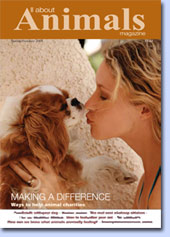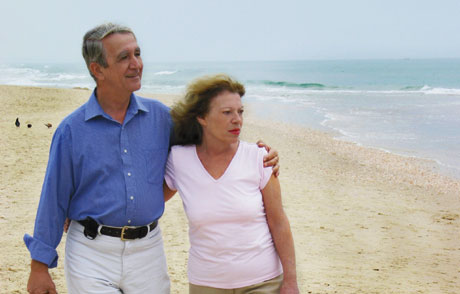- All About Animals
- The magazine for animal lovers.

- For a complimentary copy please telephone 0870 2406871
- Email the Editor

- Write with your opinion on the magazine and life in general after retirement. Click here.
- Register your vote
- Should workers be encouraged by their employers to stay on after retirement?

Sentimental Value
Although I advocate a clutter-free existence, I must admit I am a sentimentalist at heart and therein lies the rub. How can you be both sentimental and clutter-free, when one involves the amassing of assorted ephemera and the other involves getting rid of it?
Sentiment is not a rational thing - it is seated in the heart and connects us with people and places we love and times we have enjoyed. There is nothing wrong with collecting items that remind you of such things, but many people fall into the trap of keeping too much stuff in the name of sentiment and then feeling overwhelmed by it.
When someone close to you dies, such as a parent, you may be the one who is left to sort out his or her possessions. I often work with bereaved individuals and I believe that everyone has a different 'right time' to get rid of things after a death. Some people find it easier to get rid of everything quickly, and may even be under pressure to do so if there is a house to be sold; for others it is a longer, more gradual process. Go at your own pace but, whatever you do, don't just leave it. Being surrounded by the belongings of another person, and perhaps the sad memories attached to them, is not good for your energy levels and will drag you down if left for too long. There is a time to grieve, but also a time to move on and continue your own life.
Death of a parent
I have found that one of the hardest tasks that people have to deal with is disposing of the effects of their parents. Even the smallest and most mundane items can move you to tears; a biscuit tin that you remember from childhood, a battered old tea cosy or a pair of spectacles; all can have special associations and will take on huge significance - they are your lasting physical reminders of a person who has been in your life longer than anyone else.
Helping clients to sort through the personal effects of a deceased relative is always a poignant exercise for me. The minutiae of existence form a snapshot of a life and I quickly build up a picture of the deceased person and a real sense of their personality. Although a lot of the stuff might be intrinsically valueless, I am acutely aware that these were the items that made up a life, yet once they are dispersed from the home they become anonymous objects that no one wants.
You may feel that stripping your parents' home of its contents is like dismantling the person you loved, but try not to be overtaken by your heart. If you try to absorb all their belongings into your own home you will quickly reach clutter crisis and I would strongly advise against it. You will already be feeling low after your bereavement and will find it very hard to move on if you are constantly surrounded by inherited clutter and the mental baggage that comes with it. Inherited clutter will not make you feel good, and giving it room in your own house simply delays the moment that you have to deal with its disposal.
I always advise clients to keep a few key items as reminders of the person they loved and then let the rest go. If you have inherited furniture you don't like, give it to charity so it will benefit someone else, or put it in an auction and buy something that you really like with the money gained from the sale. Get pleasure from knowing that the items will find new homes with people who will enjoy using them again.
Case Study
Anne
I started to work with Anne six months after she had lost her husband, John. He had been ill for several years and she was devastated when he died. They had no children, so Anne was valiantly struggling to get organised on her own, despite acute bad health and bouts of deep depression. Although they had been happily married for 30 years, John had been married before and Anne told me that the memory of his first wife (who had died young) had always been a shadowy presence in their marriage. John has been a historian, a well as an avid reader and keen collector. He was also a meticulous hoarder and there were many boxes of stuff, labelled in great detail, which Anne needed help to sort through and dispose of after his death.
I visited her every month for over a year, and little by little we sorted John's stuff. The deeper we went into the cupboards, the older the stuff was that we pulled out. Being taller, I stood on the ladder and handed things down to Anne, who was sitting on a chair unpacking the boxes. Because of John's careful labelling, I knew what was in the boxes before I passed them to Anne and I was apprehensive when I found the box of love letters and photographs from John's early days with his first wife. It was a poignant and tender collection, a record of a young and passionate love, which included their marriage certificate, passports and his army ID badge. I could see at a glance that this relationship had been special and I understood why John had secretly preserved its memory and kept it from Anne.
Poor Anne. She felt very hurt and angry that John could have been 'so disloyal' to her by keeping these mementoes, but admitted to me that she felt a sense of relief to have found only these things, which were simply innocent keepsakes. 'I have reached the bottom of the barrel', she said. 'There's nothing else to find out so now the only way for me is up'.
Anne did not wish to keep any of the photos or letters and she asked me if I could take them and burn them for her, which I did. As I watched the photos melting into the flames, I felt a real sadness that the memory of this loving relationship had just disappeared, and although I had known neither of these people I felt strangely moved.
I continued to visit Anne. Some sessions she laughed at what we found, others she cried. For her, it was a long and rocky road through her grief and her clutter; it seemed like every time she got on to a straight run she would unexpectedly find something of John's ' even a small item ' that brought back all her feelings of grief again. At times she felt daunted by the amount of stuff she still had to deal with, but I kept urging her to look back at how far she had already come ' and not forward at how far she still had to go.
Getting rid of things
Rebuilding normality after you have lost a life partner or loved one is a long process. Getting rid of things that once belonged to that person is a huge step in acknowledging that they have gone. Some people feel that it is disrespectful or disloyal to get rid of things that belonged to a loved one, or that it in some way diminishes that person. This is not the case. If you love someone, whether they are here or not, they will always be important in your life, but you should not feel guilty about disposing of their belongings if you really don't wish to keep them. You don't need to be hardhearted about it, but turning your home into a shrine is not a healthy way forward for you.
If you are really struggling with getting rid of things, ask a close friend or relative to help you decide what could go first. You might find it easiest to get rid of stuff that you don't really like or that has no real sentimental attachment for you. Clothes are possibly the hardest things to part with as they are the most personal items, but some people want to get rid of clothes first.
There may be painful reminders everywhere in your home that you keep coming across when you least expect to. Designate a special place - perhaps a wardrobe or chest of drawers - where you can safely keep things that remind you of your loved one. I'm not suggesting that you strip your house entirely of daily reminders of someone, but that you make the memories manageable so you are not constantly overwhelmed as you try to get your own life back together.
People often ask me what they should do with collections, hobby equipment or valuable items that had belonged to their spouse, particularly when there are no children, or if the children have no interest in taking the items. An easy solution is to sell the items. Look in Yellow Pages for your local auction house, who will give you free valuations and sell items on your behalf. Or there may be local groups/associations whose members might like to buy certain items - your partner may well have been a member of one himself. One of my clients, whose late husband had been a keen stamp collector, was able to sell most of his stamp collection to other collectors in a local philately group and was happy to know that the stamps had gone to people who would appreciate them and look after them. Another solution is to donate items to places where they will be used and enjoyed by others who need them. One woman I worked with decided to donate all of her late husband's photographic equipment to a sixth form college so that it could be used by 'A' level art students. Many people are happy to give things away if the items will be used and appreciated by others n
An extract from 'Simplify your Life' by Naomi Saunders,
by kind permission of Sheldon Press
